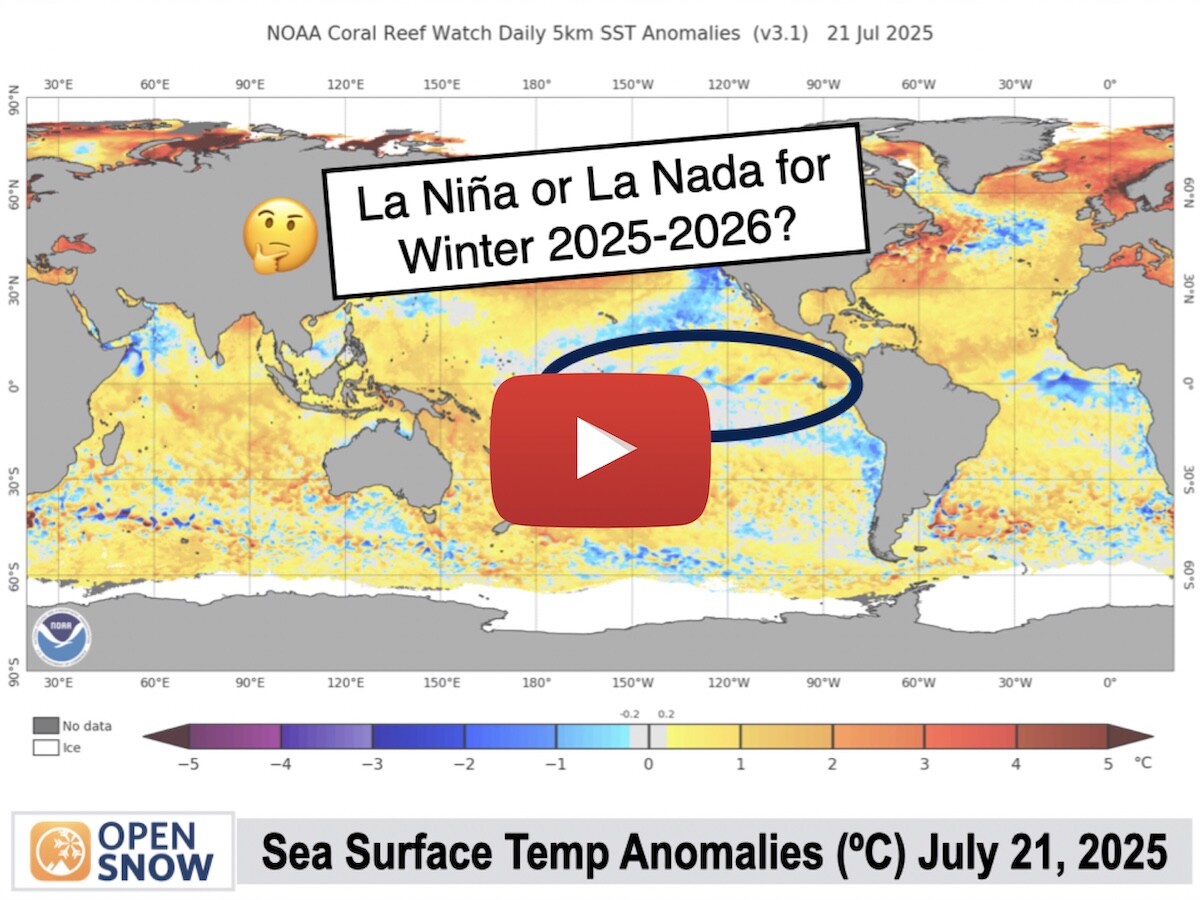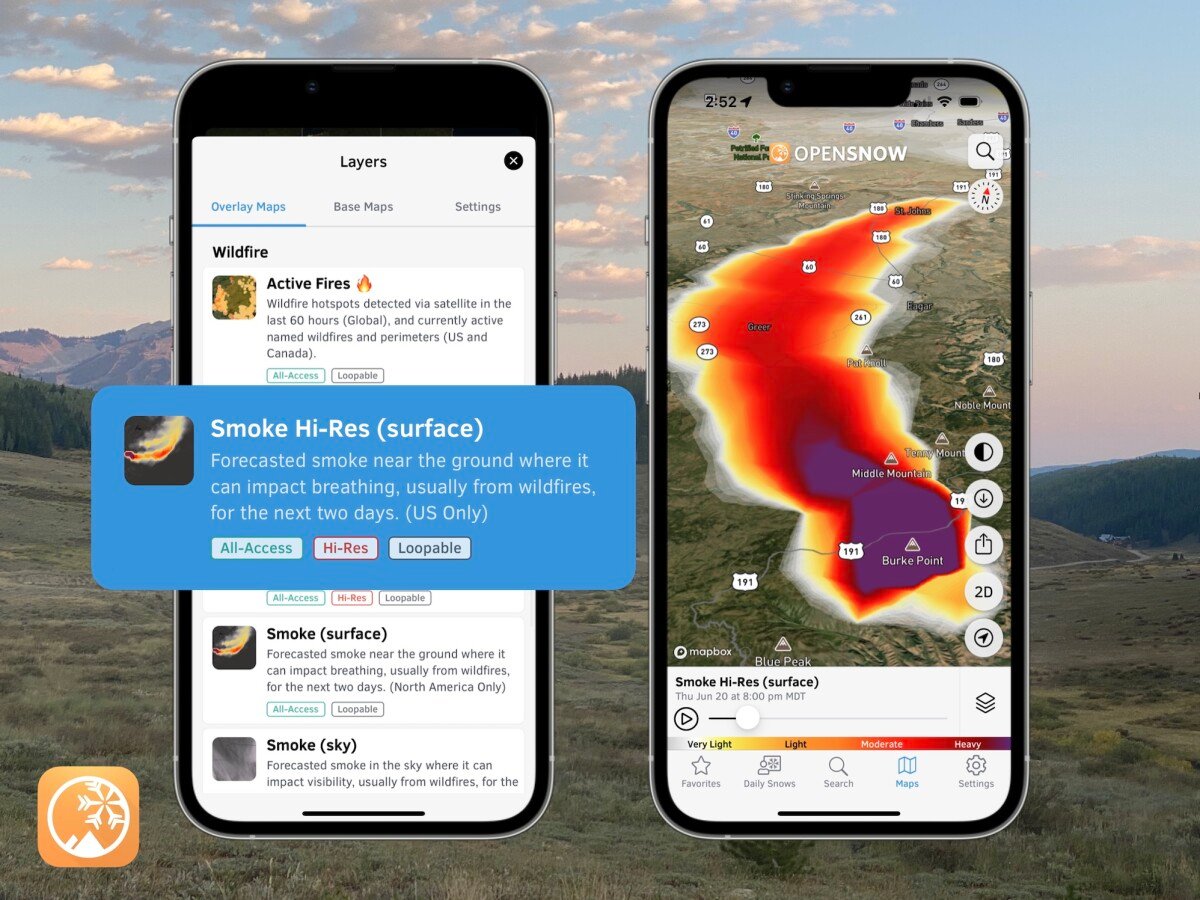News

By Sam Collentine, Meteorologist Posted 1 year ago August 29, 2023
2023-2024 Colorado Winter Forecast Preview

The 2022-2023 winter was a banner ski season for Colorado. The snowpack trended above normal from December through April and close to record territory in March thanks to cold temperatures and consistent storms.
As we look ahead to the 2023-2024 winter season, it's important to remember that any winter outlook will contain an inherent degree of uncertainty. However, there are a few clues that we can keep an eye on thanks to everyone's favorite weather phenomenon: El Niño.
For the upcoming winter season, an El Niño looks to be in store, and better yet, current sea surface temperatures are showing a strengthening El Niño event.
El Niño, Explained
The term El Niño refers to the large-scale ocean-atmosphere climate phenomenon linked to periodic warming in sea-surface temperatures across the central and east-central equatorial Pacific.
El Niño represents the warm phase of the ENSO cycle and means that the ocean water temperatures are warmer than average.
Ski Season Snowfall vs. El Niño
The map below shows winter snowfall during seven significant El Niño episodes across the United States. The higher the number, the stronger the El Niño. The blue dots are above average, the white dots are average, and the orange dots are below average snowfall.

The relationship tends to be a mixed bag for El Niño and snowfall in Colorado with most of the state close to average precip and temps during the winter months.
Historical El Niño Seasons @ Steamboat Ski Resort
After looking back at the seven most recent significant El Niño years and comparing them against the 30-year median snow water equivalent (SWE) on March 31 of 42.0 inches at the Tower SNOTEL station near Steamboat, I've found that the median SWE near Steamboat during those El Niño years is 39.6 inches on March 31 or 95% compared to the 30-year normal.
SWE on March 31 During El Niño
- 1991-2020: 42.0" (30-year normal)
- 1982-1983: 44.5"
- 1986-1987: 34.8"
- 1991-1992: 39.6"
- 1997-1998: 44.0"
- 2002-2003: 43.0"
- 2009-2010: 32.8"
- 2015-2016: 38.5"
Three out of the seven El Niño years produced above-normal snow water equivalent (SWE) near Steamboat on March 31.
For timing, when looking at the change in SWE each month during the seven most recent significant El Niño episodes and comparing them against the 30-year median change in SWE for that month...
- October: 4.6" (177%)
- November: 7.4" (100%)
- December: 4.9" (71%)
- January: 7.0" (76%)
- February: 7.0" (76%)
- March: 8.0" (118%)
- April: 6.7" (160%)
It tends to be that the shoulder seasons are above normal, while the winter months are below normal.
Historical El Niño Seasons @ Winter Park Ski Resort
After looking back at the seven most recent significant El Niño years and comparing them against the 30-year median snow water equivalent (SWE) on March 31 of 18.2 inches at the Berthoud Summit SNOTEL station near Winter Park, I've found that the median SWE near Winter Park during those El Niño years is 20.5 inches on March 31 or 113% compared to the 30-year normal.
SWE on March 31 During El Niño
- 1991-2020: 18.2" (30-year normal)
- 1982-1983: 21.5"
- 1986-1987: 16.3"
- 1991-1992: 21.1"
- 1997-1998: 18.4"
- 2002-2003: 20.5"
- 2009-2010: 17.6"
- 2015-2016: 20.8"
Five out of the seven El Niño years produced above-normal snow water equivalent (SWE) near Winter Park on March 31.
For timing, when looking at the change in SWE each month during the seven most recent significant El Niño episodes and comparing them against the 30-year median change in SWE for that month...
- October: 1.6" (229%)
- November: 2.5" (81%)
- December: 2.4" (67%)
- January: 2.8" (88%)
- February: 2.9" (91%)
- March: 6.5" (148%)
- April: 3.7" (103%)
It tends to be that the shoulder seasons are near or above normal, while the winter months are below normal.
Historical El Niño Seasons @ Copper Ski Resort
After looking back at the seven most recent significant El Niño years and comparing them against the 30-year median snow water equivalent (SWE) on March 31 of 14.6 inches at the Copper Mountain SNOTEL station, I've found that the median SWE at Copper during those El Niño years is 13.7 inches on March 31 or 94% compared to the 30-year normal.
SWE on March 31 During El Niño
- 1991-2020: 13.7" (30-year normal)
- 1982-1983: 14.5"
- 1986-1987: 10.9"
- 1991-1992: 13.0"
- 1997-1998: 13.7"
- 2002-2003: 16.5"
- 2009-2010: 11.2"
- 2015-2016: 14.8"
Three out of the seven El Niño years produced above-normal snow water equivalent (SWE) for Copper on March 31.
For timing, when looking at the change in SWE each month during the seven most recent significant El Niño episodes and comparing them against the 30-year median change in SWE for that month...
- October: 1.1" (122%)
- November: 3.0" (120%)
- December: 1.6" (62%)
- January: 1.9" (63%)
- February: 1.9" (68%)
- March: 3.4" (121%)
- April: 1.2" (109%)
It tends to be that the shoulder seasons are above normal, while the winter months are below normal.
Historical El Niño Seasons @ Vail Ski Resort
After looking back at the seven most recent significant El Niño years and comparing them against the 30-year median snow water equivalent (SWE) on March 31 of 18.8 inches at the Vail Mountain SNOTEL station, I've found that the median SWE at Vail during those El Niño years is 19.4 inches on March 31 or 103% compared to the 30-year normal.
SWE on March 31 During El Niño
- 1991-2020: 18.8" (30-year normal)
- 1982-1983: 24.6"
- 1986-1987: 15.9"
- 1991-1992: 20.9"
- 1997-1998: 16.2"
- 2002-2003: 20.6"
- 2009-2010: 14.6"
- 2015-2016: 19.4"
Four out of the seven El Niño years produced above-normal snow water equivalent (SWE) for Vail on March 31.
For timing, when looking at the change in SWE each month during the seven most recent significant El Niño episodes and comparing them against the 30-year median change in SWE for that month...
- October: 2.1" (175%)
- November: 3.7" (123%)
- December: 1.8" (56%)
- January: 2.6" (87%)
- February: 3.5" (97%)
- March: 5.6" (117%)
- April: 3.3" (413%)
It tends to be that the shoulder seasons are above normal, while the winter months are below normal.
Historical El Niño Seasons @ Aspen Snowmass
After looking back at the seven most recent significant El Niño years and comparing them against the 30-year median snow water equivalent (SWE) on March 31 of 15.8 inches at the Independence Pass SNOTEL station near Aspen, I've found that the median SWE near Aspen during those El Niño years is 15.8 inches on March 31 or 100% compared to the 30-year normal.
SWE on March 31 During El Niño
- 1991-2020: 15.8" (30-year normal)
- 1982-1983: 16.6"
- 1986-1987: 15.8"
- 1991-1992: 14.0"
- 1997-1998: 14.9"
- 2002-2003: 16.2"
- 2009-2010: 15.8"
- 2015-2016: 15.0"
Two out of the seven El Niño years produced above-normal snow water equivalent (SWE) near Aspen on March 31 but the trend is very close to normal.
For timing, when looking at the change in SWE each month during the seven most recent significant El Niño episodes and comparing them against the 30-year median change in SWE for that month...
- October: 1.5" (136%)
- November: 3.6" (109%)
- December: 2.1" (75%)
- January: 1.8" (64%)
- February: 2.5" (83%)
- March: 3.5" (125%)
- April: -0.3" (150%)
It tends to be that the shoulder seasons are above normal, while the winter months are below normal.
Historical El Niño Seasons @ Crested Butte Ski Resort
After looking back at the seven most recent significant El Niño years and comparing them against the 30-year median snow water equivalent (SWE) on March 31 of 13.0 inches at the Butte SNOTEL station, I've found that the median SWE at Crested Butte during those El Niño years is 13.1 inches on March 31 or 101% compared to the 30-year normal.
SWE on March 31 During El Niño
- 1991-2020: 13.0" (30-year normal)
- 1982-1983: 14.5"
- 1986-1987: 15.4"
- 1991-1992: 11.7"
- 1997-1998: 12.2"
- 2002-2003: 13.4"
- 2009-2010: 12.0"
- 2015-2016: 13.1"
Four out of the seven El Niño years produced above-normal snow water equivalent (SWE) for Crested Butte on March 31.
For timing, when looking at the change in SWE each month during the seven most recent significant El Niño episodes and comparing them against the 30-year median change in SWE for that month...
- October: 1.3" (325%)
- November: 3.4" (142%)
- December: 1.0" (37%)
- January: 2.6" (93%)
- February: 2.7" (129%)
- March: 2.9" (112%)
- April: -3.5" (117%)
It tends to be that the shoulder seasons are above normal, while the winter months are below normal.
Historical El Niño Seasons @ Red Mountain Pass
After looking back at the seven most recent significant El Niño years and comparing them against the 30-year median snow water equivalent (SWE) on March 31 of 22.5 inches at the Red Mountain Pass SNOTEL station, which is situated between Telluride to the west and Silverton to the east, I've found that the median SWE on Red Mountain Pass during those El Niño years is 22.7 inches on March 31 or 101% compared to the 30-year normal.
SWE on March 31 During El Niño
- 1991-2020: 22.5" (30-year normal)
- 1982-1983: 29.3"
- 1986-1987: 31.3"
- 1991-1992: 25.9"
- 1997-1998: 21.1"
- 2002-2003: 17.5"
- 2009-2010: 22.7"
- 2015-2016: 20.0"
Four out of the seven El Niño years produced above-normal snow water equivalent (SWE) for Red Mountain Pass on March 31.
For timing, when looking at the change in SWE each month during the seven most recent significant El Niño episodes and comparing them against the 30-year median change in SWE for that month...
- October: 1.8" (113%)
- November: 4.4" (110%)
- December: 2.4" (62%)
- January: 3.4" (79%)
- February: 4.1" (95%)
- March: 7.0" (159%)
- April: -0.2" (50%)
It tends to be that the shoulder seasons are above normal, while the winter months are below normal.
Historical El Niño Seasons @ Wolf Creek Ski Resort
After looking back at the seven most recent significant El Niño years and comparing them against the 30-year median snow water equivalent (SWE) on March 31 of 27.0 inches at the Upper San Juan SNOTEL station near Wolf Creek, I've found that the median SWE near Wolf Creek during those El Niño years is 27.5 inches on March 31 or 102% compared to the 30-year normal.
SWE on March 31 During El Niño
- 1991-2020: 27.0" (30-year normal)
- 1982-1983: 42.0"
- 1986-1987: 35.9"
- 1991-1992: 33.3"
- 1997-1998: 27.5"
- 2002-2003: 25.9"
- 2009-2010: 27.2"
- 2015-2016: 26.7"
Five out of the seven El Niño years produced above-normal snow water equivalent (SWE) near Wolf Creek on March 31.
For timing, when looking at the change in SWE each month during the seven most recent significant El Niño episodes and comparing them against the 30-year median change in SWE for that month...
- October: 2.2" (575%)
- November: 6.5" (138%)
- December: 4.5" (67%)
- January: 3.7" (64%)
- February: 5.5" (87%)
- March: 7.6" (245%)
- April: -3.4" (89%)
It tends to be that the shoulder seasons are above normal, while the winter months are below normal.
2015-2016 El Niño Season
The most recent El Niño in 2015-16 produced normal to above-normal snowfall across Colorado.
- Steamboat: 408" (110%)
- Winter Park: 360" (103%)
- Vail Mountain: 342" (97%)
- Aspen Highlands: 254" (101%)
- Wolf Creek: 443" (114%)
Overall, history tells us that Colorado tends to be right around average for snowfall during El Niño winters, with the potential for a stronger start and end to the season.
Having said all of this, for skiers and snowboarders, keep in mind that when it comes to finding the best conditions, it’s all about timing. To have the best chance of enjoying the deepest powder, our recommendation is to book a trip 7-10 days in advance.
Sometimes, longer-range forecasts can identify possible storms 1-2 weeks (or longer) in advance, but often, forecast confidence in the details of each storm only begins to increase when the system is about one week away or closer.

If you're ready to level up your weather app for the upcoming winter season, consider upgrading to OpenSnow All-Access. Whether you’re chasing powder, searching for sunny days, or something in between, our 10-day snow forecasts, expert "Daily Snow" forecasters, and high-resolution weather maps have you covered.
But don't just take my word for it ... "Any weather app can give a mediocre forecast for a mountain town, but only OpenSnow provides a good idea of actual mountain conditions. It's a small price to pay ($29.99/year) for the best weather forecasts." – Real App Review
Sam Collentine
[email protected]
About The Author




